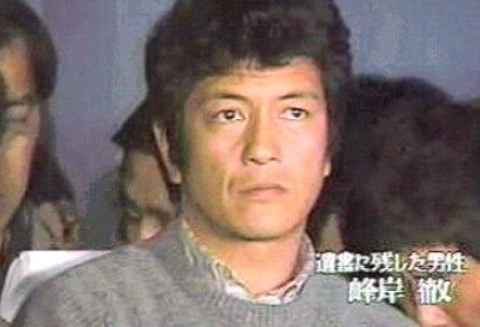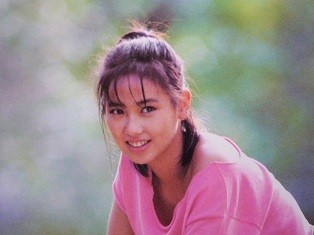Why did Yukiko Okada die?
The short answer is, no one knows. Yukiko Okada never revealed her thoughts to anyone, and her death was a shock even to those closest to her. Because of this, there is room for endless speculation on her reasons, and where her thoughts might have been in the days leading up to her suicide. While there will never be true closure to the mystery, there are a few hints that may provide some clarity as to why Yukiko chose to end her own life that day. But the truth of the matter will remain a mystery.
Tooru Minegishi

This is the closest there is to a 'confirmed' reason, and was essentially the only reason the media paid any attention to. Tooru Minegishi was Yukiko’s co-star in Kinjirareta Mariko, and although the two never interacted outside of work, it’s apparent the young 18 year old developed a crush on him. She is alleged to have written his name in her suicide note (the exact contents of which have never been revealed), and claimed her suicide attempt was because she’d “thought of someone.” She even attempted to phone him on the night before her suicide attempt, although the phone was instead answered by his fiance, with Minegishi unaware she’d tried to call. That Yukiko had feelings for the actor 26 years her senior is an undeniable part of the story.
At the time, the media latched onto the ‘broken heart’ theory, and Minegishi was hounded by the press, with some reporters demonising him for the part he allegedly played. Not helped were the unsubstantiated rumours that they’d had an affair. Speaking in a press conference immediately after Yukiko’s death, Minegishi had this to say.
She was a bright girl, but she was naive, and had the tendency to get depressed. I tried to be like an older brother to her, but maybe her feelings were a tad different. It might be presumptoius for me to say, but that's what first love can be like.
He claimed he’d not seen her since the Kinjirareta Mariko wrap-up party, and the two had communicated only via occasional phone calls. Despite this, it’s clear to see that Yukiko’s feelings for him were overwhelming. The distance between herself and the actor old enough to be her father must have felt great, and it’s possible she felt a deep loneliness being apart from him. Yukiko had just moved to her own apartment, and the loneliness of returning to that dark room, only 1km away from where Minegishi lived, must have been immense.
Overwork

One of the ironies of the initial press coverage of Yukiko’s suicide was how her death was seen as in spite of the amount of work she had, rather than because of it. A busy schedule is a good thing. It’s proof you’re successful, you're selling records and surviving the brutal entertainment industry. As the years have gone by and terms like ‘Karoshi’ and ‘Black Company’ have entered the popular lexicon, the disastrous effect overwork can have on mental health has become better appreciated in Japanese society.
Having translated the entirity of Yukiko’s work schedule from July 1984 onwards, I can say the amount of work she was given was simply untennable. On any given day, she would have radio appearances, TV appearance, and that’s not even including singing and dance practice and school studies on top of that. The amount of true days off was extremely limited, and she only received one single ‘Off’ day in her first year after debuting. It goes without saying that such a schedule would doubtless lead to high levels of stress and other mental health problems, not to mention the added mental health problems caused by lack of sleep. This would have been worsened by the fact that she was practicing three times as much as other idols, and was keeping on top of her studies as well. Which brings me to my next point.
Yukiko’s Perfectionist Personality

In a 2016 interview on Bakuhou The Friday, former managing director of Sun Music Tokio Fukuda claimed he believed the reasons for her two suicide attempts were different. The first was, as the media reported, because she was longing for Tooru Minegishi. The second, on the other hand, was because she couldn’t bare the thought of being an idol burdened with the scandal of a suicide attempt. She simply couldn’t bear being an imperfect idol.
Yukiko’s desire to be perfect is a reoccuring theme in her life. Unlike her peers, who were too busy with their idol careers to focus on studying, Yukiko was a model student, putting as much effort into studying as she did performing. She would never express her true feelings, even with her friends, perhaps afraid of presenting as anything other than a happy idol. Not allowing herself to be anything less than the the perfect would have led to a huge amount of stress being bottled up, and when her efforts to remain perfect all came to nothing, it would have had a disastrous effect on her state of mind. Yukiko’s perfectionist personality has been commented on by many of the people close to her, and this is the reason the book 岡田有希子はなぜ死んだ (Why did Yukiko Okada die) concludes with.
Yasuko Endou

The Yukko Syndrome that followed Yukiko’s death is well-known, but Yukiko was not the only idol to kill herself that year. Yasuko Endou was mostly known as a gravure idol, and gained recognition for her role as the villainous Ayumi Machida in Sukeban Deka. Two months before she was meant debut as a singer, she committed suicide by jumping off a building, aged just 17. To this day, the song that was supposed to be her first single, In the Distance, has never been publically released. The reporting at the time claimed the reason she'd killed herself was because she was being pressured to break up with her male friends.
Although the two never met, in the small world of the Japanese idol industry, Yukiko was doubtless aware of Yasuko’s suicide. It’s claimed the day before her death, Yukiko casually brought Yasuko’s suicide up with a friend.
"It wasn't anything to kill herself over... If she really didn't want to seperate with that boy, she could have given up singing. I feel so sorry for her."
It’s well-known that news of a celebrity suicide can trigger copycat suicides. Yukiko’s suicide itself would lead to many young people choosing to follow her. Even though Yasuko Endou's suicide was not widely reported, it’s not unreasonable to believe that her death may have influenced Yukiko’s decision, if only subconsciously. Perhaps Yukiko saw herself in the young idol who chose to end her life.